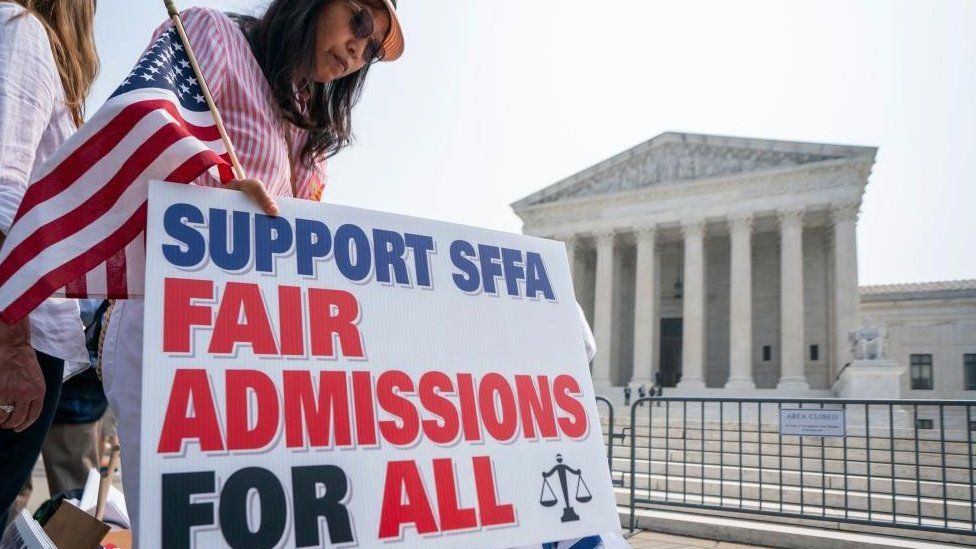
Affirmative action: US Supreme Court overturns race-based college admissions

An activist from Students For Fair Admissions celebrates the opinion
By Bernd Debusmann Jr
BBC News, Washington
The US Supreme Court has ruled that race can no longer be considered a factor in university admissions.
The landmark ruling upends decades-old US policies on so-called affirmative action, also known as positive discrimination.
It is one of the most contentious issues in US education.
Affirmative action first made its way into policy in the 1960s, and has been defended as a measure to increase diversity.
US President Joe Biden said he “strongly” disagreed with the court’s decision, and that the US would need “a new path forward that is consistent with the law”.
“We cannot let this decision be the last word,” he said. “Discrimination still exists in America”.
The cases concerned admissions at Harvard and the University of North Carolina (UNC). The court’s conservative majority ruled 6-3 against UNC and 6-2 against Harvard.
The justices sided with an organisation called Students for Fair Admissions, founded by a conservative activist, Edward Blum.
The group argued before the court last October that Harvard’s race-conscious admissions policy violated Title VI the 1964 Civil Rights Act, which bars discrimination based on race, colour or national origin.
Chief Justice John Roberts wrote: “Many universities have for too long wrongly concluded that the touchstone of an individual’s identity is not challenges bested, skills built, or lessons learned, but the color of their skin.”
His majority opinion said UNC and Harvard’s policies were “well intentioned”.
But he wrote: “Harvard’s admissions process rests on the pernicious stereotype that ‘a black student can usually bring something that a white person cannot offer.'”
Image source, CQ-Roll Call, Inc via Getty Images
Protesters outside the Supreme Court last October
Justice Clarence Thomas, the nation’s second black justice and a conservative who has long called for an end to affirmative action, wrote that such programmes were “patently unconstitutional”.
“Universities’ self-proclaimed righteousness does not afford them license to discriminate on the basis of race,” he said.
The opinion, the Supreme Court noted, does not mean that universities are prohibited from considering an applicant’s “discussion of how race affects his or her life”.
Among the liberal justices to dissent was Justice Sonia Sotomayor, who wrote that the decision “rolls back decades of precedent and momentous progress”.
She said the ruling “cements a superficial rule of colorblindness as a constitutional principle in an endemically segregated society”.
Another dissenting liberal justice, Ketanji Brown Jackson, who is black, wrote that the decision is “truly a tragedy for us all”.
“With let-them-eat-cake obliviousness, today, the majority pulls the ripcord and announces ‘colorblindness for all’ by legal fiat,” she said.
But Justice Roberts wrote that the dissenting justices had ignored parts of the law they did not like.
“Most troubling of all is what the dissent must make these omissions to defend: a judiciary that picks winners and losers based on the color of their skin,” he said.
Image source, Reuters
The Supreme Court’s decision fell along ideological lines, with liberal Justice dissenting.
In a statement, UNC Chancellor Kevin Guskiewicz said that while it is not the outcome that the university “hoped for”, it will review the decision and “take any necessary steps to comply with the law”.
Harvard’s president Lawrence Bacow said: “We will certainly comply with the court’s decision.” He added that the Ivy League college remained committed to being “a community comprising people of many backgrounds, perspectives, and lived experiences”.
Mr Blum, the founder of Students for Fair Admission, celebrated is group’s success in the blockbuster ruling.
He called it “the beginning of the restoration of the colorblind legal covenant that binds together our multi-racial, multi-ethnic nation”.
“These discriminatory admission practices undermined the integrity of our country’s civil rights laws,” he said.
Former US President Donald Trump, the current Republican frontrunner for next year’s election, hailed the decision as a “great day”.
Americans with “extraordinary ability and everything else necessary for success” are “finally being rewarded”, he said on social media.
The Supreme Court has twice backed affirmative action programmes at US universities, most recently in 2016.
Nine US states already have bans on race-based college admissions in place: Arizona, California, Florida, Georgia, Oklahoma, New Hampshire, Michigan, Nebraska and Washington.
In California, voters rejected a 2020 ballot measure to bring back affirmative action, 24 years after it was banned.
The conservative-leaning Supreme Court enraged many US liberals last year when it voted to overturn Roe v Wade, a 1973 ruling that granted women abortion rights.
Several more recent rulings, however, have been cheered by liberals, including one on Native American child welfare and three others on election laws in Alabama, Louisiana and North Carolina.
Source: https://www.bbc.co.uk/news/world-us-canada-65886212?at_medium=RSS&at_campaign=KARANGA















